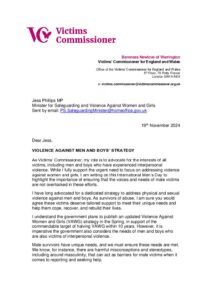Letter to the Minister for Safeguarding and VAWG on the need for a dedicated strategy to address interpersonal violence against men and boys
Baroness Newlove, the Victims' Commissioner, has called on the government to create a dedicated strategy for male victims of interpersonal violence, highlighting the unique needs and challenges they face.
In her letter, the Victims’ Commissioner emphasises the shortcomings of the current approach, which categorises male victims under a broader Violence Against Women and Girls (VAWG) strategy, and urges the government to develop a tailored plan with specific policies, milestones, and funding to better support male survivors.
Letter to the Minister
Dear Minister
VIOLENCE AGAINST MEN AND BOYS’ STRATEGY
As Victims’ Commissioner, my role is to advocate for the interests of all victims, including men and boys who have experienced interpersonal violence. While I fully support the urgent need to focus on addressing violence against women and girls, I am writing on this International Men’s Day to highlight the importance of ensuring that the voices and needs of male victims are not overlooked in these efforts.
I have long advocated for a dedicated strategy to address physical and sexual violence against men and boys. As survivors of abuse, I am sure you would agree these victims deserve tailored support to meet their unique needs and help them cope, recover, and rebuild their lives.
I understand the government plans to publish an updated Violence Against Women and Girls (VAWG) strategy in the Spring, in support of the commendable target of halving VAWG within 10 years. However, it is imperative the government also considers the needs of men and boys who are also victims of interpersonal violence.
Male survivors have unique needs, and we must ensure these needs are met. We know, for instance, there are harmful misconceptions and stereotypes, including around masculinity, that can act as barriers for male victims when it comes to reporting and seeking help.
Indeed, the Independent Advisor to the UK government on Criminal Justice Responses to Sexual Violence recently highlighted the need for different approaches to prevention, investigation and support for male victims. In her Operation Soteria survey findings, Professor Hohl found male survivors were less likely than female survivors to feel that the police actively protected them from the perpetrator or investigated their cases fully, were less likely to experience officers as kind, and less likely to feel that the officers made them comfortable or treated them like they mattered.
The differences in type of perpetrator were also evident by survivor gender. For women, the most common type of perpetrator was a current or former partner (29%), while for men, it was a family member (28%). Additionally, women were more likely to have perpetrators who were friends or colleagues (18% compared to 12% for men), whereas men had a higher proportion of perpetrators in a professional role or position of trust (15% compared to 9% for women).
These findings highlight the need for distinct approaches to prevention, investigation, and support that account for the different experiences and challenges faced by male victims.
Regrettably, the last government chose not to pursue a dedicated strategy for male victims, despite calls from the men’s support sector and my predecessor, Dame Vera Baird. They argued that the drivers and impacts of interpersonal violence against men and boys differ significantly from those affecting women and girls.
Instead, the Home Office published in 2022 a ‘Supporting Male Victims’ document as an addendum to the overarching VAWG Strategy and the Tackling Domestic Abuse Plan. In its first manifestation, the document was clumsily titled: ‘Supporting male victims of crimes considered violence against women and girls.’ This was regrettable.
The document title was later revised following stakeholder criticism. However, this change does not alter the fact that the government continues to categorise sexual and domestic violence against men and boys under the umbrella of ‘violence against women and girls.’ Male survivors will not identify with this labelling, nor should they have to.
When this was first published, Dame Vera warned that through this confused and contradictory language and approach, this document was not only inadequate but also at risk of actively promoting the very harmful stereotyping the document itself cautions against. I share her view.
I believe it is beyond time for a dedicated men and boys’ strategy, with specific policies, strategic milestones, and accompanying funding. A tailored approach for male victims of interpersonal violence is essential to developing their rights and ensuring the availability of appropriate support services.
I urge you to seize this opportunity to create both a robust, cross-governmental VAWG strategy and a separate, comprehensive strategy for men and boys, with clear policies, strategic targets, milestones, and sustainable funding arrangements.
This International Men’s Day feels like an opportune moment to amplify these calls, but my commitment to this cause is not confined to any single day. I have consistently advocated for the rights and needs of men and boys and will continue to do so until we achieve meaningful progress and deliver the support they deserve.
A copy of this letter will be published on my website.
Kind regards
Baroness Helen Newlove
Victims’ Commissioner for England and Wales

